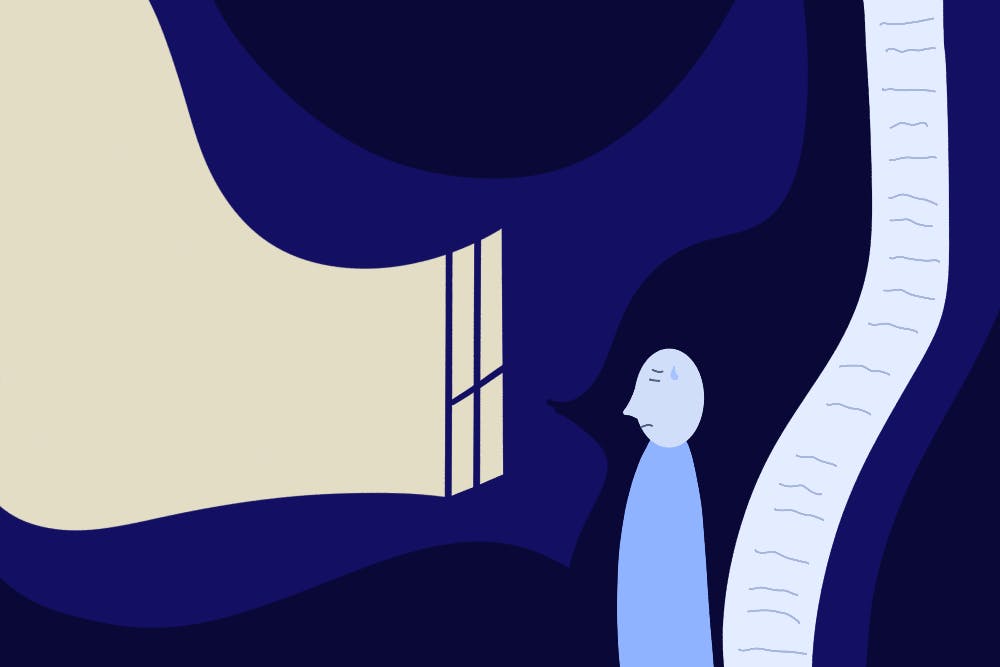The hours between 2 to 5 a.m. are my favorite part of the day. The typical sounds from my dorm—winter boots shuffling towards the stairs at the end of the hall, the occasional thuds and crashes from neighboring rooms, the chirp of the door lock as people scan their room keys—finally lull to a stop. As I sit at my desk, feeling the drifts of cold air creeping through my window, I indulge in the fact that there are no immediate deadlines, time–crunch assignments, or emails to attend to. It is truly the most tranquil time of day. Unfortunately, I enjoy it at the expense of my sleep schedule.
Little did I know, there is actually a term to describe this form of late–night leisure: revenge bedtime procrastination.
Although the exact origins of the phrase are unknown, the earliest mention that journalist Daphne K. Lee found was from a November 2018 blog post. The author of the post, a man from Guangdong province in Southeast China, described that during the workday he “belonged to someone else,” and that he could only “find himself” when he got home and could rest. Essentially, revenge bedtime procrastinators sacrifice their sleep in order to regain a sense of control or freedom that they lack during the day.
The term may have first been popularized in China, but its effects are felt across boundaries and generations. In particular, this phenomenon has gained significant attention from Gen Z on TikTok. A particular TikTok video, which explains the idea of revenge bedtime procrastination, has over 15.5 million views and three million likes. The comments are flooded with a whopping 76,000 people saying that this video “called out” their toxic sleeping habits.
It was strangely affirming to see that so many people felt the same way, united in our warped sense of happiness from getting “alone time” at three in the morning.
At the same time, revenge bedtime procrastination makes it painfully clear that self–care is still considered a luxury, not a necessity.
In a society where 24/7 productivity culture is normalized—and even celebrated—the capitalist workday isn’t designed to maintain well–being or rest. When basic activities like decompressing and relaxation are discouraged and excluded from our schedules, it is unsurprising that people become willing to sacrifice their sleep hours for leisure. The pandemic has made the balance between work and rest even more precarious. Work literally follows us home everyday, and the expectation to be constantly available is higher than ever before.
But why do people feel the need to have leisure time instead of just going to sleep? Aren’t they interchangeable forms of rest? Not exactly. Ciara Kelly, a lecturer from Sheffield University, makes an important distinction between the two. She explains that while sleep is one of the most important parts of recovery from work, the quality of our sleep is affected by how well we can detach from work pressures before we even close our eyes. Winding down and relaxing is therefore a crucial precursor to a good night’s rest.
Ideally, people would have enough time to set aside for adequate sleep and leisure, but this isn’t always feasible. The United States is one of the most overworked countries in the world, yet offers little to nothing when it comes to childcare, health care, sick and parental leave, and vacation days.
The lack of sleep, rest, and leisure we get isn’t just a personal problem—it’s a systemic one.
Revenge bedtime procrastination, and the problem of toxic productivity culture more broadly, has pushed psychologists to question if our current sleep schedule is even the most effective form of rest for our minds and bodies. One alternative to the typical eight–hour chunk of sleep at night is something called biphasic sleeping. TikToker Madeline Pendleton recently posted a TikTok about her interest in this novel sleep pattern, which separates our sleep schedules in smaller blocks of time to clearly distinguish time for work and leisure.
Regardless, revenge bedtime procrastination is relatable to a wide swath of the population, but it shouldn’t be. Overworking, sleep deprivation, and burnout are not things we should glamorize. It’s become more important than ever to treat leisure as what it is—a basic human necessity.







